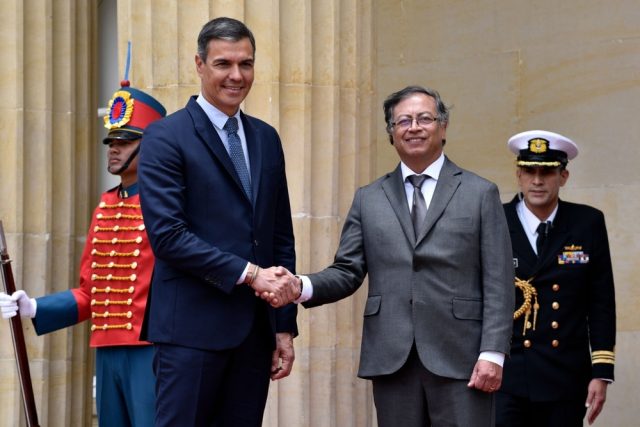
This week the socialist Spanish government welcomed President Gustavo Petro of Colombia. Unlike other recent diplomatic visits, Prime Minister Pedro Sánchez dusted the red carpets and glitzed the city of Madrid to honor the former guerrilla warrior turned Head of State. So much so, as it is common from his obvious contempt for the Royal Family, that he forced the King and Queen to receive the president with the highest regal and military honors. One must wonder, why would the Head of Government of a modern parliamentary democracy that a whole continent looks up to, placates—to borrow a phrase from Vox’s (ECR-affiliated) Santiago Abascal—to an “unapologetic terrorist”?
Gustavo Petro represents the interests of ‘Grupo de Puebla’ and ‘Foro de São Paulo’. For the past decade, these two leftist organizations have not lived up to its ideals of social justice. Rather, they have served as a conclave for modern socialist autocracies to organize coordinated strategies to remain in power and conquer new countries in their totalitarian struggle. Petro is the latest move in the chessboard of the Cuba, Nicaragua, and Venezuela axis. With almost one year governing one of the America’s largest economies, Petro has faced serious accusations on his links with drug cartels, has offered them to legalize the drug market, and has legitimized the corrupt Caracas regime of Nicolás Maduro.
On the other hand, Pedro Sánchez has governed Spain for four years with the far left and the support of pro-independence parties whose main aim is to break the territorial integrity of the country from within. To sustain this unsavory, “Frankenstein”, coalition—which is currently experiencing a moment of significant fragility—Sánchez has bowed to the leftist forces of the Iberic-American community despite their human rights abuses and their calls for insurrection. Before leaving Bogotá for Madrid, president Petro announced in a public address that, if the systemic reforms he is proposing failed to be approved, there will be “a revolution”.
Europe must carefully monitor these authoritarian trends in the Americas. It should do so with distress and a sense of urgency, especially considering Spain’s upcoming presidency of the Council of the European Union. Spain is, after all, the gateway of the global Hispanic community to Europe and should serve as a filter and wall against the noxious inclinations of the autocratic regimes at the other side of the ocean.
Sánchez government, however, appears to be adopting a different, contrarian, position. He must be contained. Just yesterday, Petro told Sánchez to lobby the EU to remove the ELN (National Liberation Army)—a guerilla group responsible for the deaths of over 6 thousand people—from its lists of terrorist organizations, so that it could “achieve a political status”. When these sort of Machiavellian political maneuvers occur, European conservatives must fight against them. Because the European values of liberty, democracy, and the rule of law must prevail.
Parliamentarians should also be mindful of the political moment in Spain. On May 28th the Spanish citizens will vote on municipal and regional elections. Later this year, they will go to the polls again for the General Election, where Pedro Sánchez will vie for power once more. Given his proven disregard for checks and balances—that has garnered him two votes of no-confidence—it should come as no surprise that he will try to exploit the European presidency for political expediency.
Fortunately, there are strong voices within and outside of Spain calling out autocracies like the ones Sánchez and Petro support. Foro Madrid, for example, has organized hundreds of parliamentarians in Europe and the Americas to counter the influence of the far left and their anti-democratic agenda. In March, they held their second regional conference in Lima, Peru where Petro and his allies are trying to reinstall former president Pedro Castillo (who attempted a coup last year and is now in prison). Incidentally, Foro Madrid had its first conference last year in Bogotá, the Colombian capital.
If Europe is to be a model for the world, if we really intend to strengthen our geopolitical standing, we must rally behind these initiatives. We must stand for democracy and liberty everywhere, all the time.



 Subscribe
Subscribe